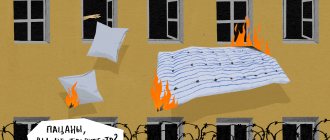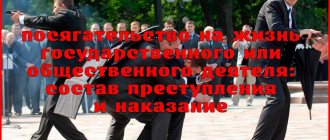In early March, it became known that inmates in a correctional colony in Tatarstan rebelled after one of them refused to allow guards to photograph his tattoos. Tattoos of convicts are an important, almost sacred part of prison culture: not only the images have their own meaning and meaning, but also the attitude towards them. Perhaps this is why the jailers’ unceremonious demand outraged the prisoners so much. There are many myths about what traditions Russian prisons and colonies live by - very common, but often having nothing to do with reality. Is it true that a newcomer will be punished if he violates the ritual by entering the cell? How does the life of a convict in the zone turn out depending on his article? And how true are the statements that violence reigns everywhere in the colonies? Former Russian prisoner Mikhail Krasnobaev told Lenta.ru about the main prison myths and how true they are.
In 2015, 26-year-old Mikhail Krasnobaev was convicted of “Preparation for the sale of narcotic substances.” Mikhail himself did not deny that he stored prohibited substances, but claimed that it was solely for personal consumption. However, instead of a suspended sentence and registration at a drug dispensary, he received five years in a maximum security colony.
Mikhail was one of those who is called a “nerd” behind his back: he graduated from school with a gold medal, was never interested in sports and was far from the criminal world. When the young man was taken into custody in the courtroom, he was very scared. He believed everything that “knowledgeable people” told him about prisons and zones, and was terrified at the prospect of experiencing it all for himself.
Myth No. 2. “You have to enter the “hut” correctly”
The second very common fear among those who find themselves in prison for the first time is that, out of ignorance, they will allow such behavior for which they will face severe punishment. Prison folklore is indeed rich in riddles and jokes, but the fate of a prisoner and his status in the prison hierarchy is not determined by knowledge of the correct answers.
Photo: Dmitry Korotaev / Kommersant
As in ordinary life, the attitude towards a person in the zone is determined by his actions. Below are the main tenets of correct behavior in prison, following which the prisoner will be protected from problems. The most amazing thing is that many people know all these things from childhood, from their parents, and therefore it is easy and simple to follow them.
Lying is bad. Taking someone else's property without asking is bad. Not keeping promises is bad. Reporting on loved ones is bad. Humiliating the weak is bad. Saying bad things about someone behind their back is bad. Laughing at what is dear to another is bad. Solving an issue using physical force is bad. Maintaining hygiene and not causing discomfort to others is good.
Not only are these rules of conduct generally elementary: to newcomers to the zones who have made some mistakes out of ignorance, many things are forgiven and explained. For the first time!
First person story.
It was summer and school was over. But high school students have been taking exams for more than one day. And then about sixty people were immediately released early. Among them is the horn of Milo's squad. He was a normal guy, although he had great physical strength, but he didn’t beat anyone for nothing, and sometimes he stood up for them. Instead of him, the Tatar Mehlya was installed as a horn. He comes from Chelyabinsk, small in stature, but very strong in build. The boss told Mekhla that he would release him by the beginning of autumn if he kept order in the detachment. When Mehlya was appointed horn, he began to carry a stick with him everywhere. One day, when they were getting ready to go to the canteen, I was a little late and was the last to run into the line.
“Yes, you, Eye, have become a greyhound,” Mekhlya growled and began to bludgeon me with a stick. There was no mercy in his blows, holding her with both hands, he waved her like a propeller, I didn’t even have time to dodge. Mekhli's eyes became bloodshot, he became like a mad animal, he could not stop. And the stick, as luck would have it, was strong and did not break, not allowing me to catch my breath. No one had hit him so hard before, and for the first time I began to beg him: “Mekhlya, stop, what did I do?” Mekhla liked to see my torment, cursing, he continued to beat me. Then, apparently, he got tired. He stood there, caught his breath, and went about his business. Vadik is a thief of the third squad. He was seventeen years old. Handsome, athletic build, every girl's dream. He also always walked with a stick. Only he didn’t offend the boys, he occasionally applied it to the insolent mounds. Both the asset and the thieves were different from the pupils. They were clean and neatly dressed and wore blue berets (we wore black ones). Vadik tied a thin purple scarf around his neck. He tied it so beautifully and skillfully that it looked like a tie. His teacher gave him this scarf. Everyone knew that they were in a relationship, but management was never able to catch them. The teacher was getting ready to go on vacation and Vadik decided to make a holiday for her. He communicated well with Mekhla and they began to organize dances. They brought a tape recorder into the detachment.
Myth No. 3. “You’re a weakling, they’ll break you in one go in the zone.”
Being physically absolutely undeveloped, I, of course, was afraid that in the zone I would be bullied by people stronger than me, who are the majority there. In reality, everything turned out to be completely different.
If we take the famous thieves in law - Vladimir Babushkin (Vasya Brilliant) or Alexander Severov (Sasha Sever) - then none of them looked like a steroid muscleman or a wiry strongman.
In the zone, it is the strength of the spirit that is assessed first, not the strength of the body.
Moreover, prisoners try to resolve conflicts through negotiations, so there are much fewer fights in our zones than, for example, in the USA. Moreover, for letting the prisoner loose hands, the “supervisor” or “prisoner” (representatives of criminal authorities in places of deprivation of liberty - approx. Lenta.ru)
).
By the way, historically in the zones, the gym and good food were available only to the “reds” (close to the prison administration) - supply managers, foremen, orderlies and orderlies. They later became part of the so-called sections of discipline and order (SDP).
These sections were in fact engaged in beating new prisoners on the tacit orders of the administration
This is where a certain disdainful attitude towards “athletes” came from among decent prisoners. So muscles in the zone don’t play a big role: it’s much more important to talk informatively, draw logical conclusions, and most importantly, not swear.
“The lowest caste in the zone consists of rapists”: confession of a convicted journalist
For almost a hundred years of the existence of Moskovsky Komsomolets, who has not worked for our newspaper!
Chemists, geologists, artists worked (and are working, by the way), and, in the end, people without higher education in general...
There were even those who, due to the peculiarities of the political system, were sent straight from the editorial office to arrest, and then to places not so remote. There are also those who, when the authorities became more liberal, were sentenced to compulsory work at their place of service.
And this is not surprising - the doors of MK are always open to those who have the talent and desire to tell people all the most important and interesting things. And a criminal record - with our laws and lawyers - is a relative concept.
Therefore, when the author of today’s material came to us a year ago and said: “I want to work for you, but I honestly admit: I am convicted by a court verdict,” we did not wave our hands in horror and did not send him to where he actually came from. and arrived. And they offered to try it.
Start. Liberty
I am writing these lines on September 13th. Today my eldest child, son Klim, is 1 year and 4 months old.
And today is exactly a week since I am a free person.
For some, freedom means allowing yourself a cocktail at a Friday bar; others will consider themselves free by escaping in the winter to where it’s warm and sunny. And for me, freedom is the opportunity to be with those who are dear to me, to do what I like.
Just recently I was deprived of this.
I was destined to be born in Central Asia and end up in Russia as a refugee. My family - my mother and her brother and relatives - settled in the Saratov region. The industrial town warmly welcomed into its arms my uncle, a physicist, and my mother, who had recently mastered the profession of a proofreader. My mother read a newspaper at a local media holding, which served as a guide for me when choosing a profession.
Distant 2008. A still frame from a story on local television in Balakovo.
From early childhood I watched how strips were laid out and stories were edited. He became the editor of the school newspaper, won several children's competitions, and got a job on television for the summer. Having passed the exams quite well, in 2009 I set off to conquer the capital. At the same time, he worked wherever he could: as a courier, a seller of SIM cards and sushi, and even managed to become an assistant to a fortune teller.
In the summer of 2011, I met my love at a health camp in the Moscow region. I was assigned to a difficult group - children from a boarding school from the Arkhangelsk region, in which the oldest children already had criminal records, although they were only a year younger than me. In the same place, but in a completely contrasting detachment, where children from Moscow studied English, my future wife Masha worked as a counselor.
Masha entered the university, we met and fell more and more in love with each other. We decided to leave our studies in Moscow together and fly to China. They wanted to study at Harbin University and had already even received an invitation from there, but all this was not destined to happen. I was arrested.
Arrest
It all started with the fact that one of my older fellow countrymen was “mistaken” for distributing drugs in the Kaluga region. This guy is a creative person; he played in a popular band in our city. By the way, even now, while behind bars, he became a finalist in the “Kalina Krasnaya” competition for prisoners from all over the country, the main prize of which is release.
I knew about his destructive hobbies, I even saw how a friend, together with his girlfriend, an experienced drug addict (she herself boasted that almost all the teeth in her mouth were false, had fallen out from “chemistry”), smoked hashish. It didn’t matter to me at all, I thought it was their life and their health. So the friend’s arrest was not a surprise - he was caught while selling several hundred grams of dope.
After some time, his girlfriend asked me to go to the investigator and pick up his car and personal belongings. I went to the neighboring area: after all, this is my friend too. On receipt, I was given his Zhiguli car and a bag with gadgets and personal belongings confiscated from him.
Along the way, the car broke down several times and had to be repaired. In the evening I arrived to meet a friend’s girlfriend at a cinema building in the north-east of Moscow. She immediately handed me the money, saying that it was to pay for the cost of repairing the car, and I put it in my pocket, handing over the keys and a bag of things. And he headed out.
Out of nowhere, two men with scabs appeared in my path. Together we went to the back room, where, in the presence of two dubious-looking witnesses, they told me that I was suspected of selling drugs, and that prohibited substances were found in the things I handed over. Marked bills were pulled out of his pocket.
After a day in the “monkey barn,” I was arrested for two months and taken to a pre-trial detention center in a funnel.
An SMS sent by the “purchaser” a week after my arrest.
Three days of quarantine
As you know, the first impression is the most vivid. This is probably why many who end up behind bars, after 1-2 days, will squeeze out of themselves: “You can live.” After all, at first you find yourself in quarantine, in quite acceptable conditions.
I spent a three-day quarantine in the same cell with a Tajik bribe-taker. The Asian worked as a taxi driver and wanted to give 300 rubles to the traffic cop, but the traffic policeman detained him. The cellmate behaved very quietly and almost all the time frantically remembered how to do namaz. In general, in MLS (places of deprivation of liberty) there are many jokes on the topic of how people who are far from faith immediately begin to reach out to God.
The first day in the cell I was haunted by constant knocking and screams around me. Hallucinations? But soon my fellow sufferer and I realized that they were trying to reach us. They started to answer.
We were ordered to open the windows. We opened one window without any problems, but it was impossible to reach the second with our hands - the grille was in the way. But collective intelligence is a great thing: towards the end of the second day, we came up with the idea to melt our toothbrushes and cook a “fishing rod” out of them. This device managed to open the second window. A voice from somewhere above warmly greeted us: “AUE, relatives, life for thieves!”
It was probably then that I realized that I was here for the long haul.
Pre-trial detention center
Three days later I was called in for questioning. The senior “godfather” (as detectives are called in MLS) asked a couple of general questions and one obligatory one: do I have anything to hide. I confidently answered that I have no enemies, my orientation is normal, and in general I expect to be free in a couple of months. The employee kindly laughed at my optimism, but assigned me to one of the most decent cells.
There is a practice not to keep businessmen and officials with murderers and robbers. Therefore, those accused of fraud and bribery usually sit with each other, and the safest special contingent from the point of view of self-harm is assigned to them - drug addicts and drug dealers.
Indeed, no one attacked me. They didn't even throw a towel at my feet. Yes, there used to be such a method of testing (nowadays it is used only by young children): they throw a clean towel at the feet of a new person, and if he picks it up, they begin to cling to him. The only correct solution is to wipe your feet on it.
Fraudsters, merchants and officials stayed united and aloof. Most of them had been sitting together for about a year and had clearly settled down in the pre-trial detention center. The cell had large supplies of various food, there was communication, employees rarely came for searches, no one shuffled the established composition and there was never much overload (maximum 16 people per 12 bunks).
During the day, life in the detention center is boring and monotonous. But if you believe that everyone sleeps in a pre-trial detention center at night, this is a deep misconception. After lights out, a lively conversation begins “on the road.”
What does it look like?
Using homemade fishing rods, prisoners drag “horses” (ropes woven from sheets) into their cells through the windows, to which pockets (usually socks) are tied. They put little things, prohibitions and thieves' runs (instructions) in them. This is the connection between prisoners.
Standing “on the road” is a very responsible matter, because in addition to technical maintenance of communication (weaving “horses”, timely adjustment), you need to know all the encoded signals. For example, a certain sequence of taps on the battery means that a search is underway, and if you do not react in time and not tell others, then you can frame people who are calling their relatives or a lawyer at this time. After all, employees who come unexpectedly will take away your mobile phone, and it costs about 4 times more in a pre-trial detention center than in the wild.
The “road” is usually the first step, the elevator to the world of thieves. But from the point of view of my cellmates, this activity was absolutely pointless. Which adult, accomplished man wants to stay up at night and weave ropes?
Sitting with me were high-ranking employees of transport companies, various ministries and departments, businessmen and bankers. Many of the inmates had legal degrees. One of these people, who took patronage over me, was known throughout the pre-trial detention center for being very successful in drawing up complaints and advising prisoners on legal issues. Much like Tim Robbins' character in The Shawshank Redemption.
Photo for memory. With a “looker” on its lower “bracket”.
Court
The second colossal shock for any prisoner is the beginning of the trial. To be honest, I did not believe that the process of delivery to the temple of justice could be organized so badly.
The procedure for going to a court hearing looks something like this. At about 6.00 you are taken out of the cell and taken to the assembly - to a cell with an area of about 25 “squares” on the first floor, where all participants in the processes are brought together.
The first time I was there at rush hour, I couldn’t help but remember historical films about the slave trade - it felt like you were in the hold of a galley. There are only a few such assemblies, one of which is usually occupied by those who cannot be mixed with the general mass, while others are filled to capacity. So, in one room you could count up to 50 people, 45 of whom smoke.
The smoking, cackling mass stands on its feet for about three hours. Then everyone is packed to capacity into cramped paddy wagons and taken to the courts. The day ends in the same order, and those who came from the ships, where at best they managed to sleep on a narrow bench, go up to their cells in the same orderly manner around one in the morning. But many go to meetings every day!
The defense lawyer spelled out for me that if I don’t admit guilt, I’ll get at least eight years. The likelihood that I will prove my innocence later is very small, and it will depend more on procedural issues rather than on the materials.
She suggested that I confess to the crime and trust in the judge’s mercy, in the fact that he took into account all our evidence, and in the fact that, after all, it’s the end of December and no one wants to postpone the open case until next year. And she was right! I trusted and reluctantly squeezed out of myself that I admitted my guilt. The prosecutor asked for 8 years, and the sentence was 4 years of strict regime. Half of the minimum punishment limit!
I am still grateful to this judge - his last name is Polovnikov, and, being in court already on the instructions of the editors, I wanted to find him, but it turned out that he no longer works there. Thanks to his humanity, I was not overcome by blind hatred of the system, as happened to many others who found themselves in trouble. When I happily (yes, exactly happy, because I was in the mood for eight) returned to the pre-trial detention center, the news of the verdict spread throughout all the cells - it was a sensation.
A couple of weeks later I was sent to the prison camp. I heard through some prisoners that the issue of being sent to a specific camp was resolved for 200 thousand rubles.
Let me note that absolutely everything is bought and sold in the pre-trial detention center. A cluster of lawyers, human rights activists, experts, public organizations, employees of the Federal Penitentiary Service, and prisoners is a mechanism capable of plundering the wealthiest prisoner, along with all his relatives and friends, in the shortest possible time. But for me the requested amount turned out to be unaffordable.
Stage
According to my registration, I was sent to serve my sentence in the Saratov region. The most memorable moment from the trip to the colony was loading and unloading. A paddy wagon delivers the convicts to the station, where they are escorted and handcuffed to a “Stolypin” carriage, “fastened” to a regular train with ordinary passengers.
Walking along the platform after months of living on the same “square” with a company of men, you catch yourself thinking that these sensations are indescribable. And the meeting of the “Stolypin” carriage - oh, this is a completely different movie. Prisoners in padded jackets (no one is sent without standard clothing) are placed on the platform under machine guns and hounded by dogs, and from the carriage to the platform they have to run and squat in a row in front of the machine gunners. This is because this is the most dangerous period of the journey - according to statistics, during the stage when unloading from the cars, the largest number of escape attempts occurs.
Inspection on the way, during transit - a shock worse than the road to court. Everyone was forced to do squats, things they didn’t like were cut, cigarettes were broken, even transparent food packages were opened and simply thrown on the floor. Those who tried to somehow defend their position were taken to the quarters and beaten with wooden mallets, which are “in service” with all security department employees. With their help, security officers check the integrity of the bars during inspections. The sawn rods break under the blows of wooden hammers. Prevention of escapes, nothing can be done!
The colony. Quarantine
Many who have been languishing for years under investigation and trials are really looking forward to their stage, because a colony is at least an opportunity to see the sky without a checkered pattern. I won’t lie, I was waiting for me to leave the pre-trial detention center. But, having crossed the threshold of the zone, I thought: maybe it wasn’t so bad in the isolation ward?
First of all, all new arrivals are taken to the quarantine toilet, where they are forced to wear a red bandage: the convict takes a photograph of you “as a souvenir.” This is done so that if a prisoner nevertheless decides to build a career in the thieves’ environment, he can be put in his place with this photo, since wearing a bandage is incompatible with the desire for the criminal world.
Those who are especially stubborn are forced to pick up a rag and touch the toilet at least once. From a hygienic point of view, this is completely safe - not every hospital is cleaner than in quarantine. The point is different: to suppress morally and cut off the convicted person’s path to thieves’ traditions.
From my stage, all three people, including me, fulfilled the requirements and ended up in a cubicle (room), where the convicts continued to work with us - the supply manager and day quarantine workers.
They consistently handed us psychological tests with ready-made answers, questionnaires, applications for joining various sections (for example, SDP - section of discipline and order; in the criminal world it is strictly not recommended to be a member of such organizations, and even more so to condone the administration in establishing a regime), various receipts for signature, and when one of us began to read it, they raised their voices and hurried us in every possible way.
Among these pieces of paper was the most terrible document - that I was warned that if I tried to escape, lethal fire would be opened in my direction.
With a trembling hand, I put down a squiggle and went to clear the snow in the yard. And so for two weeks - non-stop cleaning in the barracks and on the territory, peeling potatoes in the kitchen and sleeping without hind legs. Oh yes, during this time we also had to learn the Russian anthem, which 14 days later was taken as an exam by the officer who released us into the zone.
Zone
After leaving quarantine, we felt relief - we were sent to a transition barracks. This barrack was also at the mercy of the caretaker and the orderlies - camp activists. In it lived those who had committed a crime and were temporarily sent to this detachment, those who could not find a place for themselves in the zone, and people like us - those who had arrived recently.
As for those who work in these two detachments, most of them are completely lost people. Only one of them was cut down in my presence, many of my predecessors died in freedom, and those who worked at the same time as me were sent funeral wreaths from the outside as parcels. These people, having power in the detachment, try to complicate the lives of others, put moral pressure on those around them, and hand over those they cannot cope with to the administration.
We, newcomers, were explained several times how to get into active positions, where to go to work in order to remain normal men. It was then that I remembered the words of my first cellmates: in prison you don’t owe anyone anything. If you do not follow this covenant, you will perish.
The day before everyone was assigned to sewing production, the head of the operations department came to me. For the conversation, the caretaker of the transition barracks kindly provided us with his personal office with a DVD player and heater.
I listened carefully to the opera man, who offered to go work for him. My only condition was that I would not inform on anyone, but I was ready to complete technical tasks (the department required an orderly to work on a computer), and I did not care what other prisoners said.
So I ended up in the most secret and most terrible place of the colony. When one of the prisoners was called into my boss’s office, they usually went to the toilet first, since the visit could end up in a hospital bed. My responsibilities included preparing reports - monthly, quarterly and annual - maintaining documentation for prisoners on preventive records, and much, much more. There was a lot of work, but in my free time I could watch movies on the computer. And most importantly, all the employees knew me, I was on my own.
Another, most pleasant bonus was that I regularly received incentives for my work and my Masha could come to me for long dates (3 days) more often: instead of 4 times a year - 6 times. On the very first meeting - it was a short four-hour date - I proposed to her, and she agreed.
On a long date we got married. An employee of the local registry office arrived and Masha brought me a jacket, shirt, trousers and shoes. And with a pre-prepared recording of Mendelssohn's march on the DVD player, we exchanged rings.
03/14/2014. Wedding in a maximum security colony.
Once an emergency happened: I gave my parcel limit to one of the thieves, and when they brought him a box of cans of stewed meat, they were opened upon receipt to check for the presence of prohibited items. Moreover, they opened all the cans, wanting to annoy the recipient. He refused to pick up the essentially damaged parcel and called a lawyer to prepare a complaint. But formally, I had to sign for receiving the parcel, and the employees brought me a card to sign. There is an autograph - that's it, the package has been received, claims are not accepted. I couldn't do that. Because of this, I was kicked out of the operations department, and the caretaker of one of the barracks took me to his detachment.
And again the usual picture changed. Prisoners walked around me in sportswear, and not in the standard uniform, as I was used to. Many had telephones and the Internet, and there was nap time in the barracks.
But there were also those whose lives turned into one continuous hell. Those who seemed to have fallen hundreds of years ago, into the slave system or the Stone Age. This lower caste consists mainly of rapists and pedophiles.
They have become so degraded that they eat from garbage heaps and wipe down toilets with their bare hands, which are used by 50–100 men in each detachment. They are not recognized as people, and these people spend most of their time in the toilet. Nobody disputes that the crimes they committed are monstrous. And probably death would be a deliverance for them.
The next year was easier. I got involved in sports and started doing weightlifting, I started reading a lot and even learned to play a couple of songs on the guitar. I managed to quit smoking and completely eliminate swear words from my vocabulary.
In the colony I learned to play the guitar.
And after some time, when I had already served 2 years and 11 months, the court replaced the unserved year with 14 months of correctional labor, but already at liberty. There was no limit to the joy, since the courts rarely agree to such mitigation. Usually the only indulgence is parole, and for me, as a convict under a drug offense, the deadline for submitting an application for parole has not yet come. The colony staff helped me get a positive reference. By the way, a few months after my release they were arrested and imprisoned for those very cruel methods of the stages.
***
So, having escaped from this terrible place, I found myself with those I want to be with, and began to do what I like. I stayed in my native Balakovo, my wife came to see me. I immediately started writing to the local newspaper and registered with the criminal-executive inspectorate. He carried out several successful projects for his publication and joined the ranks of the Russian Union of Journalists.
And then my wife and I decided to go to Moscow. On May 13, 2021, my son was born. I got a job as an advertising agent in a company where I did correctional work, monthly deducting 15% to the state income.
One day on social networks I came across the page of human rights activist Eva Merkacheva. It is about her that legends are made in places of deprivation of liberty, saying that she is one of the few who reads and responds to appeals from prison and listens to a person, regardless of his status. And after a while I saw Eva’s post about the need for a crime reporter at MK. That's how it all turned out. Since you are reading these lines, it means that Moskovsky Komsomolets accepted me, and, I hope, did not regret it.
At the end of July, my wife gave birth to my daughter. And a week ago my main term expired, and now I will file a petition for early expungement of my criminal record, as a law-abiding citizen who is trying to benefit society. I really want to say to all those who remained on the other side of the prison bars: everything depends only on you. Circumstances and prejudices will give way to desire and perseverance, and the stigma will be erased by time and good deeds.
Myth No. 4. “An article like this will make you scrub the toilets.”
This is partly true: let’s say, in places of deprivation of liberty, toilets are washed and the streets are cleaned mainly by those who have Articles 131 (“Rape”) or 132 (“Violent acts of a sexual nature”) of the Criminal Code of the Russian Federation. And those convicted under the “narcotic” Article 228 of the Criminal Code of the Russian Federation are usually forced to allocate more from their funds for general needs than other prisoners.
But the point here is not at all in the articles. In order to determine what status a prisoner will serve for the rest of his sentence, one charge brought or even proven by a court is not enough. The prisoners learn about the person and his crime “through their own channels” and conduct their own investigation.
Photo: Yuri Tutov / Kommersant
If the prisoner’s guilt is obvious, the rapist will be “offended”, and the drug dealer will pay tribute for the entire term. But our judicial system is by no means flawless. Every fifth of those convicted under Article 228 of the Criminal Code of the Russian Federation is simply a drug addict or, even worse, a person who has nothing to do with drugs and has been framed. The attitude towards such people in the zone is friendly: no one would think of calling such a prisoner a “huckster”.
Two young teachers came with Nina Petrovna.
Mekhlya brought the boys who were nearby and said: “Please pay attention!” Our teachers organized a dance evening for all of us. let's have fun and dance. Slow music started playing. Vadik invited Nina Petrovna, Mekhlya another teacher, and the third was picked up by the hillock. We looked at the beautiful young women being hugged by the lucky ones. “Roma, all the kids need to dance, otherwise it won’t turn out well,” the teacher told Mehla. - I promise you, now everyone will have fun! Having finished this dance, Mekhlya ordered us all to dance. We didn’t want to dance boy with boy, and we weren’t in the mood for fun. After dinner it was our turn to clean the dining room, which meant that we would be beaten there. When the next dance ended, Mekhlya told the boys to go to the smoking room. - Don't want to dance?
Myth No. 5. “You’re very smart - they don’t like people like that in the zone”
There is a common belief that the typical prisoner is a narrow-minded and aggressive alcoholic. In fact, this is nothing more than a stereotype. Firstly, in the zone the prisoner has a lot of free time, during which he has the opportunity to read a lot of books, watch a lot of films and communicate with other prisoners who have their own cultural baggage.
Thus, while serving his sentence, even a person of initially low culture develops and becomes at least an interesting interlocutor
Secondly, most of the prisoner’s time is spent talking with other convicts, but stories about free life end quite quickly. And then the time comes for philosophical, political and even theological discussions, and this is another opportunity for cultural development.
Photo: Ilya Naimushin / RIA Novosti
Over the course of my five-year sentence, I myself read about a hundred books, including those that I never got around to outside. I met politicians, football players, artists and simply educated people, from whom I learned a lot of new things. But it’s true that sixty percent of prisoners at the beginning of their sentences are really narrow-minded and uncultured.
Amoeba was scrubbing the floors next to me.
I saw him pick up a piece of bread from the floor and hide it in his pocket. He slowly pinched it and ate it furtively. The amoeba did not even eat, but swallowed, since the bread was wet. We tried our best, but the cleaning was making little progress. The canteen was too huge. Then the hillock began to hit us with a stick on our twisted backs. - Quickly, quickly, quickly clean up, go to rest quickly. We moved even faster. Finally, order has been restored. We joined the squad. I couldn't feel my legs and my back hurt a lot. Amoeba had wet pants, he crawled on all fours and they got wet. The zone has been asleep for a long time. But we wanted to fall to the ground and sleep without reaching the body.
Myth No. 6. “In the zone, you get used to the chifir - you won’t be able to live without him.”
The myth about the prison chifir and dependence on him is perhaps the most harmless of all, but firmly seated in the minds of ordinary people. In fact, chifir is not addictive: it can only become a habit - like coffee in the morning. Chifir really invigorates and relieves hangovers, but its effect is comparable in strength to ordinary energy drinks.
Chifir also warms you up well and suppresses the feeling of hunger for a while.
By the way, there is a misconception that real chifir is prepared only in the zone - but this is not at all true: it is not at all difficult to prepare it at home. To do this, you need to take 80-100 grams of small-leaf tea and pour a liter of cold water.
Then all this needs to be brought to a boil, boiled for 15 minutes over low heat, cooled, and boiled again. Take a sieve, strain the broth - and the chifir is ready. It is better to drink it in small sips, adding a little salt to the drink, taste it with cheese, dried fish, chips and crackers. And if you drink chifir with sweets, the tonic effect will be stronger.
And he started hitting everyone with a stick.
No one shouted, this was not customary, but groans were heard from all sides. When we returned from the smoking room, we began to dance with each other, forcing smiles out of ourselves. I was paired with Vova Inin. Mekhlya beat off his chest and Vovka found it difficult to breathe. Vovka was a relative of the teacher, but he was beaten no less than the others. Even his relative could not help him. Mehlya was watching us all the time, we had to pretend to be in a good mood. After dinner, they gathered those who had been scrubbing floors all day; there were about thirty people. Let's go to the dining room.
There, the hill sent three of them to peel potatoes, four went to clean the boilers and put things in order in the kitchen, three went to fetch water. The marekhi remained, including me. This is my second time wearing the outfit. We moved tables and chairs to one side. The guys carried buckets of water and poured them on the floor, and we stood in a row and used rags to push the dirty water towards the exit. The mound controlled from behind. “Four are collecting water with rags in a bucket,” the mound said the nicknames. Where there was a lot of dirt, the hillock poured out water, we drove it to the boys, who collected it with rags and squeezed it into buckets.







